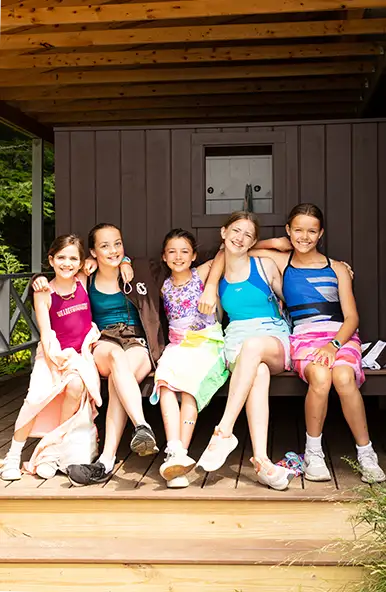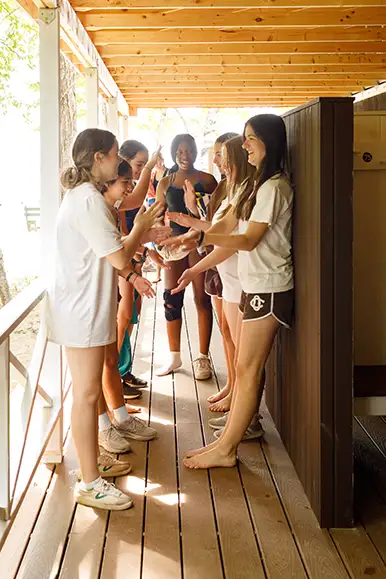Unplugging At Camp
April 2023
By Lydia Romano Barhight (Alumna, Trustee)
The other day, I was sitting on the pool deck during my five-year-old daughter’s swim lesson. Within a couple minutes, I started to feel antsy and pulled out my phone. The options are endless- shall I find a new recipe to try? Peruse photos of my friends’ travels and families? I could select which yoga class to take later, play a word game, see who is texting me…and so on. It took too long for me to hear my daughter calling “Mommy! Mommy!”—she wanted me to see a new skill she had accomplished, and I had missed it. I made a concerted effort to put my phone away for the rest of the lesson and be more present.
I know I’m not alone- many of us enjoy Pinterest sessions, online shopping, making playlists, reading the news, or using apps for audiobooks, for example. All of these tools can be wonderful, letting us learn and connect. Many schools are teaching the basics of programming with coding classes, teaching important skills for the future. However, technology being omnipresent in our lives can also take a toll. Now that we essentially have access to most information we could want, right in our pockets and purses, the temptation to be checking keeps us all looking down and missing connections around us. Finding time to unplug can have great benefits.
One of the unique aspects of a Camp Onaway summer is the opportunity to detangle and unplug all of our cords. Below are some of the possible benefits of a tech-free summer, and some ways that unplugging supports Camp Onaway values.
1. Community
Have you ever tried to have a conversation with someone who is staring at their phone? It can be distracting and even hurtful, because it can seem as though someone cares more about their notifications than what you are saying. It is difficult to attend to what is happening around you if you are looking down at a device. You can miss social cues (both verbal and nonverbal). Unplugging lets us make eye contact, connect, respond appropriately, and give another person our full attention. When we attend to one another, we build respect, love, admiration, and connection, which builds our community.
2. Self-Discovery
One of the greatest gifts of a Camp Onaway summer is the chance to try new things. Going out of our comfort zones and testing our limits is uncomfortable, but it is also how we grow. Sometimes, it is hard to try something new if you feel as though others are watching and maybe judging. Social media often focuses on how we “show” what we are doing. Taking a break from social media gives campers a chance to hit the pause button on “showing” and instead just sink in and appreciate what is happening right now, around people they trust. It takes away the pressure to document, record, and post. It takes away the worry of seeing how others will respond with “likes” and lets us focus on feeling validated by our own accomplishments, or from the support of friends and mentors around us in person. More of our energy and mental focus can be spent on the present moment.
3. Simplicity
Unplugging allows us to focus on minimalism. It is no secret that advertisers and marketers target kids and teens. Social media is full of “influencers” who are given free goods in exchange for discussing them, sampling them, and reporting back to their wider audience. This can make kids and teens feel pressured to purchase items, have the “right” clothes, and to generally keep consuming. At camp, we learn to make do with what we have in our trunks, and relax with the effortless uniform. We learn that we need much less than we think we do. We share and borrow from friends, further enhancing community. Of course, the appropriate gear for our activities keep us warm, dry, and safe, but we do not need a closet full of shoes or the latest serum. We can find beauty and peace in nature, with the calls of loons and the smell of pine needles. This is all easier to enjoy without the advertising bombardment from social media.
Unplugging also has many health benefits. Studies have linked social media use to problematic sleep, including less total sleep time, disrupted sleep (waking during the night), and delayed sleep (going to bed later; you can read more here or here). Social media use can increase feelings of sadness, loneliness, missing out, or anxiety (you can find more information here from the Child Mind Institute). Even children and adolescents are starting to present with symptoms of “Text Neck” or “Tech Neck,” which refers to pain associated with poor posture and looking down for long periods of time.
In summary, technology has many benefits, and it is unlikely that any of us would stop using our devices, or cancel all of our social media accounts, completely. However, the opportunity to put down the phones, close the apps, and cease the scrolling can give us health benefits, let us be present and mindful, and build real social connection with our Camp community.


